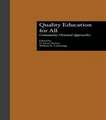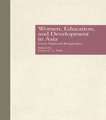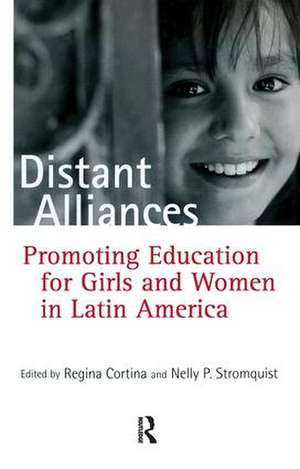Distant Alliances: Gender and Education in Latin America: Reference Books In International Education
Editat de Regina Cortina, Nelly P. Stomquisten Limba Engleză Paperback – 16 ian 2019
Din seria Reference Books In International Education
- 18%
 Preț: 1060.43 lei
Preț: 1060.43 lei -
 Preț: 354.94 lei
Preț: 354.94 lei - 15%
 Preț: 209.80 lei
Preț: 209.80 lei -
 Preț: 309.69 lei
Preț: 309.69 lei -
 Preț: 404.24 lei
Preț: 404.24 lei - 18%
 Preț: 1277.66 lei
Preț: 1277.66 lei -
 Preț: 442.50 lei
Preț: 442.50 lei -
 Preț: 490.72 lei
Preț: 490.72 lei -
 Preț: 309.69 lei
Preț: 309.69 lei -
 Preț: 442.50 lei
Preț: 442.50 lei -
 Preț: 442.50 lei
Preț: 442.50 lei -
 Preț: 198.19 lei
Preț: 198.19 lei - 18%
 Preț: 929.88 lei
Preț: 929.88 lei -
 Preț: 482.35 lei
Preț: 482.35 lei -
 Preț: 442.50 lei
Preț: 442.50 lei -
 Preț: 442.50 lei
Preț: 442.50 lei -
 Preț: 429.27 lei
Preț: 429.27 lei -
 Preț: 442.50 lei
Preț: 442.50 lei -
 Preț: 369.73 lei
Preț: 369.73 lei - 18%
 Preț: 1013.04 lei
Preț: 1013.04 lei - 13%
 Preț: 318.40 lei
Preț: 318.40 lei - 18%
 Preț: 1002.60 lei
Preț: 1002.60 lei - 17%
 Preț: 142.32 lei
Preț: 142.32 lei - 18%
 Preț: 1065.40 lei
Preț: 1065.40 lei -
 Preț: 422.59 lei
Preț: 422.59 lei -
 Preț: 211.47 lei
Preț: 211.47 lei -
 Preț: 309.69 lei
Preț: 309.69 lei -
 Preț: 422.59 lei
Preț: 422.59 lei -
 Preț: 442.50 lei
Preț: 442.50 lei - 15%
 Preț: 699.01 lei
Preț: 699.01 lei -
 Preț: 421.61 lei
Preț: 421.61 lei - 25%
 Preț: 766.66 lei
Preț: 766.66 lei -
 Preț: 483.34 lei
Preț: 483.34 lei - 18%
 Preț: 1224.24 lei
Preț: 1224.24 lei
Preț: 234.90 lei
Preț vechi: 281.27 lei
-16% Nou
Puncte Express: 352
Preț estimativ în valută:
44.95€ • 46.87$ • 37.36£
44.95€ • 46.87$ • 37.36£
Carte tipărită la comandă
Livrare economică 20 martie-03 aprilie
Preluare comenzi: 021 569.72.76
Specificații
ISBN-13: 9781138990807
ISBN-10: 1138990809
Pagini: 336
Dimensiuni: 138 x 216 x 26 mm
Greutate: 0.45 kg
Ediția:1
Editura: Taylor & Francis
Colecția Routledge
Seria Reference Books In International Education
Locul publicării:Oxford, United Kingdom
ISBN-10: 1138990809
Pagini: 336
Dimensiuni: 138 x 216 x 26 mm
Greutate: 0.45 kg
Ediția:1
Editura: Taylor & Francis
Colecția Routledge
Seria Reference Books In International Education
Locul publicării:Oxford, United Kingdom
Notă biografică
Nelly P. Stromquist is professor of education and an affiliated scholar in the Center for Feminist Research at the University of Southern California, Los Angeles and is past president of the Comparative and International Education Society. Regina Cortina is a faculty member and researcher in the School of Education at New York University.
Cuprins
Introduction; I: Gender Equity in Education Policy; Public Policies on Gender and Education in Paraguay; Gender Equity in Bolivian Educational Policies; Public Policy and Adult Education for Women in Brazil; II: Nongovernmental Organizations and the Education of Adult Women; Learning for the Construction of a Feminist Agenda within Organizations in Civil Society; Other Ways to Be Teachers, Mothers, and Fathers; Educating about Gender; Leadership Training; From the Local to the Global and the Global to the Local; III: International Development Agencies and Gender Equity in Education for Women and Girls in Latin America; Global Priorities and Local Predicaments in Education; UNESCO and the Education of Girls and Women in Latin America and the Caribbean; Restructuring Bilateral Aid for the Twenty-First Century; USAID Efforts to Expand and Improve Girls’ Primary Education in Guatemala; Ambiguities in Compensatory Policies; Conclusions
